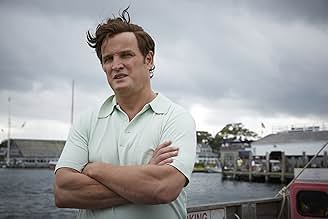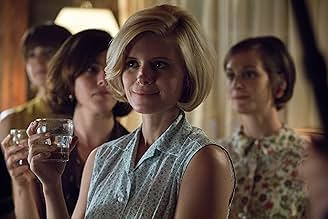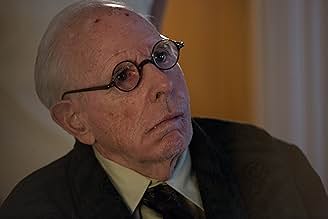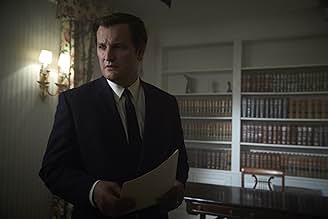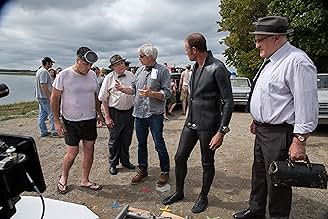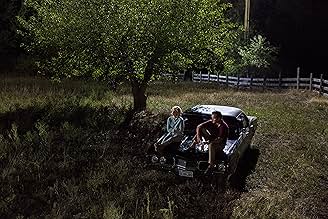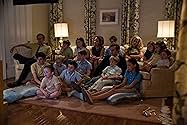CALIFICACIÓN DE IMDb
6.4/10
15 k
TU CALIFICACIÓN
Relata la implicación de Ted Kennedy en el fatal accidente automovilístico de 1969 que se cobró la vida de una joven estratega de campaña, Mary Jo Kopechne.Relata la implicación de Ted Kennedy en el fatal accidente automovilístico de 1969 que se cobró la vida de una joven estratega de campaña, Mary Jo Kopechne.Relata la implicación de Ted Kennedy en el fatal accidente automovilístico de 1969 que se cobró la vida de una joven estratega de campaña, Mary Jo Kopechne.
- Dirección
- Guionistas
- Elenco
- Premios
- 7 nominaciones en total
Gillian Mariner Gordon
- Cricket
- (as Gillian Gordon)
Katie Henoch
- Suzy
- (as Kate Henoch)
David De Beck
- Sargent Shriver
- (as David DeBeck)
Matthew Lawler
- Dun Gifford
- (as Matt Lawler)
- Dirección
- Guionistas
- Todo el elenco y el equipo
- Producción, taquilla y más en IMDbPro
Opiniones destacadas
The facts speak for themselves in this sober and sardonic telling of Senator Ted Kennedy's infamous late night car crash that drowned "Boiler Room Girl" staffer, Mary Jo Kopechne along with the subsequent cover up mostly stage managed by two of JFKs "best and brightest" Bob McNamara and Theo Sorenson. It is mostly a restrained telling as it displays less cynicism than pointing it out as the old gang huddles at the Hyannis Kennedy compound to plot and strategize for what they hope is a future President. Brother from another mother Joe Gargan attempts to get Ted to do the right thing but he is no match for the Realpolitik of Robert McNamara who is clearly running the interference, pulling strings and creating scenarios while local Sheriff Arena bungles his investigation, much of it in the favor of the Senator as a Kennedy flunky is dispatched to the deceased Ms Kopechne's parents to block access. It is a Humpty Dumpty make over and an unpleasant reminder of "justice" bought through power and influence in this democratic nation of ours.
There's an Oscar worthy performance to be found in tarnished angel's Ted played by Jason Clarke with a smarmy false bravado and unctuous cowardice while garnering great sympathy as he panics and leaves the girl to drown. Clearly the linch pin to the tragedy he is also responsible for some of the dark humor as says too much too soon, fails to re-new his license, comes up with far fetched attempts to elude blame and models a neck brace for effect before tussling on the floor with a fed up Gargan.
Kate Mara's Mary Joe rings with a mature and melancholy sincerity, her scenes with Ted tastefully handled, more concerned with revealing two people at uncertain moments in their life than a just a roll in the sand. Helms as Gargan suffers nobly and humiliatingly much by way of reaction. Bruce Dern as paralyzed dad Joe does as well but in a much more severe way while Clancy Brown's former Defense Secretary McNamara is take charge impressive in a room of heavyweights.
James Curran's direction is well paced and edited as he smoothly moves the investigation along amid the chaos of what's at stake as well as provide jarring flashbacks and allowing Mary-Jo in her own way provide brutal testimony to the audience. Overall the direction and writing (Taylor Allen, William Logan) is neither venally strident nor smugly damning as the film portrays the tragically flawed Kennedy, justifiably in some way, as a victim for being less than a great man in a circle that would not settle for anything but before once again finding himself out of his depth.
There's an Oscar worthy performance to be found in tarnished angel's Ted played by Jason Clarke with a smarmy false bravado and unctuous cowardice while garnering great sympathy as he panics and leaves the girl to drown. Clearly the linch pin to the tragedy he is also responsible for some of the dark humor as says too much too soon, fails to re-new his license, comes up with far fetched attempts to elude blame and models a neck brace for effect before tussling on the floor with a fed up Gargan.
Kate Mara's Mary Joe rings with a mature and melancholy sincerity, her scenes with Ted tastefully handled, more concerned with revealing two people at uncertain moments in their life than a just a roll in the sand. Helms as Gargan suffers nobly and humiliatingly much by way of reaction. Bruce Dern as paralyzed dad Joe does as well but in a much more severe way while Clancy Brown's former Defense Secretary McNamara is take charge impressive in a room of heavyweights.
James Curran's direction is well paced and edited as he smoothly moves the investigation along amid the chaos of what's at stake as well as provide jarring flashbacks and allowing Mary-Jo in her own way provide brutal testimony to the audience. Overall the direction and writing (Taylor Allen, William Logan) is neither venally strident nor smugly damning as the film portrays the tragically flawed Kennedy, justifiably in some way, as a victim for being less than a great man in a circle that would not settle for anything but before once again finding himself out of his depth.
Ted Kennedy and his memory even today is idolized by various women's groups. This movie shows the truth for those of us who remember his abandonment of Mary Jo and let her die a slow, agonizing death in the car he crashed. And then his contradictory stories in the cover up. The powerful family even reached into the court system to block exhumation of Mary Jo's body, thus helping the extensive coverup. This is a real story about real people and until this movie, the media protected Teddy and his powerful family. More people should see this, the truth should be out there. And Ted Kennedy should not be idolized. He should have faced a jury on manslaughter charges.
This retelling of the death of young Kennedy entourage "Boiler Room" secretary Mary Jo Kopechne and the involvement therein (or lack of same, arguably) of rising US senator and last surviving brother of the Kennedy family dynasty, Edward Kennedy, holds back little as it nails its accusatory colours to the mast.
I re-read as much background as I could on the tragic incident and it's difficult not to come to the same conclusion as the writer and director of this movie, that Kennedy firstly failed to attempt to rescue the stricken girl immediately after he escaped the sinking car, then got two of his slavishly obedient underlings to repeatedly dive into the river to try to save the girl, didn't report the matter immediately to the authorities where we learn that if he had, Mary Jo might even have made it out alive, before most shamefully of all, he played down and indeed lied about his role in the matter to go along with the abhorrent advice of the supporting Kennedy machine, a phalanx of important Democrats, including former Secretary of State Robert MacNamara, to cover up his part and so keep alive his future eligibility for the presidency.
As usual in dramatisations of real life happenings, some dramatic licence appears to be taken with events. For example was Ted Kennedy really so scared of his elderly, paralysed father, the family patriarch Joseph (played by an unrecognisable Bruce Dern) and so ashamed of himself as the underperforming last son of the family to justify acting in this deplorable spineless way? Then, was there anything sexual between Kennedy and Kopechne on the night - there are cryptic but inconclusive flashbacks shown hinting at something and Kennedy, whose wife hadn't made the trip, was a known womaniser. Did he really contemplate resigning the Senate right up to the last minute before caving into the surrounding peer pressure and instead turn his live TV broadcast into the contemptible self-serving speech it turned out to be, including his horrendous assertion that this was the infamous "Kennedy Curse" working on him - this just in Senator Kennedy, you didn't die, Miss Kopechne did - and in so saying, trying to bathe in the reflected glory of his two slain brothers? I also thought it was a major mistake to fail to mention the substantial payment that was made to the dead girl's parents, presumably to hush them up.
Only one person knows what happened on that fateful night and I concur with the film-makers' assertion here that Kennedy not only acted in a selfish, cowardly way at the scene - he even tried to weasel out of this by faking a medical report that he was concussed in the crash which affected his actions and then compounded the felony by "wearing" a neck brace for effect at the funeral.
This as I said is a brave film, justifiably, I believe, taking a side and having the courage of its convictions to stick to it. Jason Clarke is excellent as Kennedy while the rest of the lesser known cast give him credible support. The direction could have done with less of the voguish drone shots which seemed at odds with the realistic approach adopted elsewhere plus I found the soundtrack dull and again lacking affinity with the era portrayed.
I doubt this film will gain wide distribution but hope it does. It's an excellent drama, the tragedy of which is how realistically it depicted a tragically avoidable real life accident.
I re-read as much background as I could on the tragic incident and it's difficult not to come to the same conclusion as the writer and director of this movie, that Kennedy firstly failed to attempt to rescue the stricken girl immediately after he escaped the sinking car, then got two of his slavishly obedient underlings to repeatedly dive into the river to try to save the girl, didn't report the matter immediately to the authorities where we learn that if he had, Mary Jo might even have made it out alive, before most shamefully of all, he played down and indeed lied about his role in the matter to go along with the abhorrent advice of the supporting Kennedy machine, a phalanx of important Democrats, including former Secretary of State Robert MacNamara, to cover up his part and so keep alive his future eligibility for the presidency.
As usual in dramatisations of real life happenings, some dramatic licence appears to be taken with events. For example was Ted Kennedy really so scared of his elderly, paralysed father, the family patriarch Joseph (played by an unrecognisable Bruce Dern) and so ashamed of himself as the underperforming last son of the family to justify acting in this deplorable spineless way? Then, was there anything sexual between Kennedy and Kopechne on the night - there are cryptic but inconclusive flashbacks shown hinting at something and Kennedy, whose wife hadn't made the trip, was a known womaniser. Did he really contemplate resigning the Senate right up to the last minute before caving into the surrounding peer pressure and instead turn his live TV broadcast into the contemptible self-serving speech it turned out to be, including his horrendous assertion that this was the infamous "Kennedy Curse" working on him - this just in Senator Kennedy, you didn't die, Miss Kopechne did - and in so saying, trying to bathe in the reflected glory of his two slain brothers? I also thought it was a major mistake to fail to mention the substantial payment that was made to the dead girl's parents, presumably to hush them up.
Only one person knows what happened on that fateful night and I concur with the film-makers' assertion here that Kennedy not only acted in a selfish, cowardly way at the scene - he even tried to weasel out of this by faking a medical report that he was concussed in the crash which affected his actions and then compounded the felony by "wearing" a neck brace for effect at the funeral.
This as I said is a brave film, justifiably, I believe, taking a side and having the courage of its convictions to stick to it. Jason Clarke is excellent as Kennedy while the rest of the lesser known cast give him credible support. The direction could have done with less of the voguish drone shots which seemed at odds with the realistic approach adopted elsewhere plus I found the soundtrack dull and again lacking affinity with the era portrayed.
I doubt this film will gain wide distribution but hope it does. It's an excellent drama, the tragedy of which is how realistically it depicted a tragically avoidable real life accident.
There are two tragedies in this film. The first is the death of Mary Jo Koepechne, the young woman left to die in an upturned car in shallow water. The second is Ted Kennedy's ultimate refusal to accept responsibility for his negligence. The fact that the second tragedy works so well in the shadow of the first is a testament to how well the movie is written and performed.
The movie begins with a montage of Kennedy family photos and audio describing the achievements and deaths of Ted's three brothers, Joe Jr., Jack, and Bobby. The implication is that Bobby lives in a world of tragedy already, but that he also lives in the shadows of three brothers. Throughout the film, we hear from Ted, his cousin Joey, the secretaries (including Mary Jo), and even Joe Sr. that Ted either needs to find a way out of those shadows or that he will never be able to get out from them. Ted wants to be his own man, but he can't quite escape the gravitational pull of his family name that, a mere decade before, had dominated American political life.
In seeming preparation for what could be a presidential run, Kennedy rounds up Jack's secretaries in order to try and get them to work for him. He invites them to a small cabin in Martha's Vineyard to drink and participate in a boat race (that Ted embarrassingly loses). The secretaries as a whole, save Mary Jo, have bought into the Kennedy mystique completely, but Mary Jo is scarred by the deaths of the Kennedy brothers and is reticent about coming back into the "family", as Ted puts it. Ted drives her back to town in an effort to continue to try and convince her, but he takes the ill-fated turn and drives off the bridge, overturning the car.
One of his first lines of dialogue after exiting the car cuts right to him. He's gotten out of the car (he doesn't know how) and walked back to the cabin. When he sees his cousin Joey out of sight of everyone else, he says, "I'll never be president." It's not the safety of Mary Jo whom he's left behind, probably dead, that concerns him, but his political future and his ability to live up to the family's expectations.
What follows is something between a comedy of errors and a tragedy as Ted, Joey, and advisors brought in by Joe Sr. work to mitigate the situation with Ted making poor decisions left and right from a sloppily written statement to the police (that gets to the media) to a neck brace that brings nothing but scorn due to its obvious needlessness. All through this, Joey, the faithful cousin lawyer, is Ted's conscience, begging for Ted to do the right thing by calling the police right after the accident, telling the truth, and eventually resigning.
It's the final scene, Ted's address to Massachusetts and the nation, that shows Ted as completely fallen and Joey's complete degradation in the face of Ted's insistence on weathering the storm. Joey has begged Ted to resign, even writing a resignation letter at Ted's request with the expectation that Ted would read it. But it becomes obvious that Ted's not going to do it. His voice seems distant. The lighting is low. There's something wrong, and he tosses Joey's letter aside in favor of the message written by Joe Sr.'s advisors. Joey's ultimate disgrace comes when he is shanghaied into holding up the cue cards for Ted in his final half of the speech. Joey does his duty, but he simply cannot believe what he's seeing and hearing from his friend. He had expected Ted to rise up above the shadow of the Kennedy family by doing what was right, but Ted had fallen in with Joe Sr.'s view of greatness instead.
It's that final scene that really makes the movie, distilling the central conflict within Ted by using Joey perfectly in contradistinction to Ted's actions.
The movie begins with a montage of Kennedy family photos and audio describing the achievements and deaths of Ted's three brothers, Joe Jr., Jack, and Bobby. The implication is that Bobby lives in a world of tragedy already, but that he also lives in the shadows of three brothers. Throughout the film, we hear from Ted, his cousin Joey, the secretaries (including Mary Jo), and even Joe Sr. that Ted either needs to find a way out of those shadows or that he will never be able to get out from them. Ted wants to be his own man, but he can't quite escape the gravitational pull of his family name that, a mere decade before, had dominated American political life.
In seeming preparation for what could be a presidential run, Kennedy rounds up Jack's secretaries in order to try and get them to work for him. He invites them to a small cabin in Martha's Vineyard to drink and participate in a boat race (that Ted embarrassingly loses). The secretaries as a whole, save Mary Jo, have bought into the Kennedy mystique completely, but Mary Jo is scarred by the deaths of the Kennedy brothers and is reticent about coming back into the "family", as Ted puts it. Ted drives her back to town in an effort to continue to try and convince her, but he takes the ill-fated turn and drives off the bridge, overturning the car.
One of his first lines of dialogue after exiting the car cuts right to him. He's gotten out of the car (he doesn't know how) and walked back to the cabin. When he sees his cousin Joey out of sight of everyone else, he says, "I'll never be president." It's not the safety of Mary Jo whom he's left behind, probably dead, that concerns him, but his political future and his ability to live up to the family's expectations.
What follows is something between a comedy of errors and a tragedy as Ted, Joey, and advisors brought in by Joe Sr. work to mitigate the situation with Ted making poor decisions left and right from a sloppily written statement to the police (that gets to the media) to a neck brace that brings nothing but scorn due to its obvious needlessness. All through this, Joey, the faithful cousin lawyer, is Ted's conscience, begging for Ted to do the right thing by calling the police right after the accident, telling the truth, and eventually resigning.
It's the final scene, Ted's address to Massachusetts and the nation, that shows Ted as completely fallen and Joey's complete degradation in the face of Ted's insistence on weathering the storm. Joey has begged Ted to resign, even writing a resignation letter at Ted's request with the expectation that Ted would read it. But it becomes obvious that Ted's not going to do it. His voice seems distant. The lighting is low. There's something wrong, and he tosses Joey's letter aside in favor of the message written by Joe Sr.'s advisors. Joey's ultimate disgrace comes when he is shanghaied into holding up the cue cards for Ted in his final half of the speech. Joey does his duty, but he simply cannot believe what he's seeing and hearing from his friend. He had expected Ted to rise up above the shadow of the Kennedy family by doing what was right, but Ted had fallen in with Joe Sr.'s view of greatness instead.
It's that final scene that really makes the movie, distilling the central conflict within Ted by using Joey perfectly in contradistinction to Ted's actions.
Growing up in the 60's, and a fan of JFK, I recall reading about this event as an unfortunate driving accident involving Kennedy's younger brother Ted and his secretary Mary Jo, who had been drinking at a party, and were probably having an affair. Seeing this movie, I can't help but think it should have been made a long time ago, as so much is revealed about what really happened. But, I still think this is an important film for my generation and younger people who tend to hero worship without uncovering the tragic flaws. It's also a dramatic eye-opener about the political machinations used to retain power. The actors are good, the story is compelling, but more time spent on Ted before and after would have made it better. And I came away sad about Mary Jo and her family in view of her dedication to a worthy cause.
¿Sabías que…?
- TriviaThe bridge where they were driving on was the Dike Bridge on the eastern part of the island, that connects the main part of Chappaquiddick with a strip of beach that runs north/south. While there are some homes along that eastern strip of beach on the north end, the party was not at one of them. The mystery of why they were driving on Dike Bridge has never been answered.
- ErroresTed asks the operator to make a collect call and gives his name, but never gives a phone number. The operator patches the call without it. By the late 1960s, pay phones allowed callers to directly dial a collect call by dialing a 0 rather than a 1 before the area code and phone number, and then telling the operator who picked up that it was a collect call and giving the operator his/her name.
- Citas
Joseph Kennedy: You'll never be great.
- ConexionesFeatured in The Ben Shapiro Show: A Big Leftist Myth Implodes on Taxes (2017)
- Bandas sonorasLila
Written by Merrell Fankhauser (as Merrell Wayne Fankhauser)
Performed by Fapardokly
Courtesy of HD Music Now
Selecciones populares
Inicia sesión para calificar y agrega a la lista de videos para obtener recomendaciones personalizadas
- How long is Chappaquiddick?Con tecnología de Alexa
Detalles
- Fecha de lanzamiento
- Países de origen
- Sitio oficial
- Idioma
- También se conoce como
- The Senator
- Locaciones de filmación
- Productoras
- Ver más créditos de la compañía en IMDbPro
Taquilla
- Presupuesto
- USD 13,000,000 (estimado)
- Total en EE. UU. y Canadá
- USD 17,395,520
- Fin de semana de estreno en EE. UU. y Canadá
- USD 5,765,854
- 8 abr 2018
- Total a nivel mundial
- USD 18,263,470
- Tiempo de ejecución1 hora 46 minutos
- Color
- Relación de aspecto
- 2.35 : 1
Contribuir a esta página
Sugiere una edición o agrega el contenido que falta

Principales brechas de datos
By what name was Chappaquiddick (2017) officially released in India in English?
Responda






